
The Pakistan Institute for Conflict and Security Studies (PICSS) has reported a staggering 93 percent surge in suicide attacks during 2023, compared to the previous year, resulting in the tragic loss of 329 lives and severe injuries to 582 individuals.
According to the study, the most impacted regions were the tribal districts, witnessing 206 casualties in 13 suicide attacks. Khyber Pakhtunkhwa ranked second, with 306 fatalities in 10 attacks.
Security experts attribute this alarming rise to the stalled talks between the Pakistani Taliban and the government, an increase in jihadist group manpower, and a weakening of the Afghan Taliban’s control over Tehreek-e-Taliban Pakistan (TTP).
Also Read: “Sheen Pekhawar”: Peshawar’s Youth Take a Stand Against Climate Change Through Green Initiatives
The PICSS report expresses deep concern over the spike in terrorist attacks, reaching levels not seen since 2014 when 683 lives were lost in 47 blasts. In comparison to 2022, fatalities surged by 226 percent, and injuries increased by 101 percent in 2023.
Security expert and journalist Mushtaq Yousafzai supports the report, citing two reasons for the upswing in attacks. Firstly, the breakdown of negotiations with armed groups extinguished hope, leading to a shift in tactics, with suicide attacks targeting security forces to signal their resolve. Secondly, the strategy of focusing on security forces instead of civilians learned from the Afghan Taliban’s experiences, became a predominant approach.
While acknowledging the rise in the number of armed organizations, senior journalist Iftikhar Firdous emphasizes that most suicide attacks are not TTP-affiliated. Groups like Tehreek-e-Jihad Pakistan, Ansar-ul-Islam, and Hafiz Gul Bahadur in North Waziristan claimed responsibility for attacks later in the year.
Firdous notes the complexity, stating, “If we look at the strategy of militant organizations, whenever they get surplus fighters, they turn to suicide attacks from guerrilla warfare. This means an increase in their numbers has happened.”
Contrary to the Afghan Taliban spokesperson Zabihullah’s denial of attacks originating from Afghanistan, Iftikhar Firdous suggests a potential link between the violence in Pakistan and Afghanistan. He cautions that without a peace agreement between the two countries, the risk of destabilization persists in 2024.
In contrast, Pakistani forces reported 556 terrorists killed and 5161 arrested during 18736 intelligence-based operations in 2023. Tehreek-e-Taliban Pakistan, in its annual statistics, claimed responsibility for 881 attacks, resulting in 970 deaths and 23 arrests. The complex landscape of terrorism and its intricate dynamics continue to pose significant challenges for regional stability.

